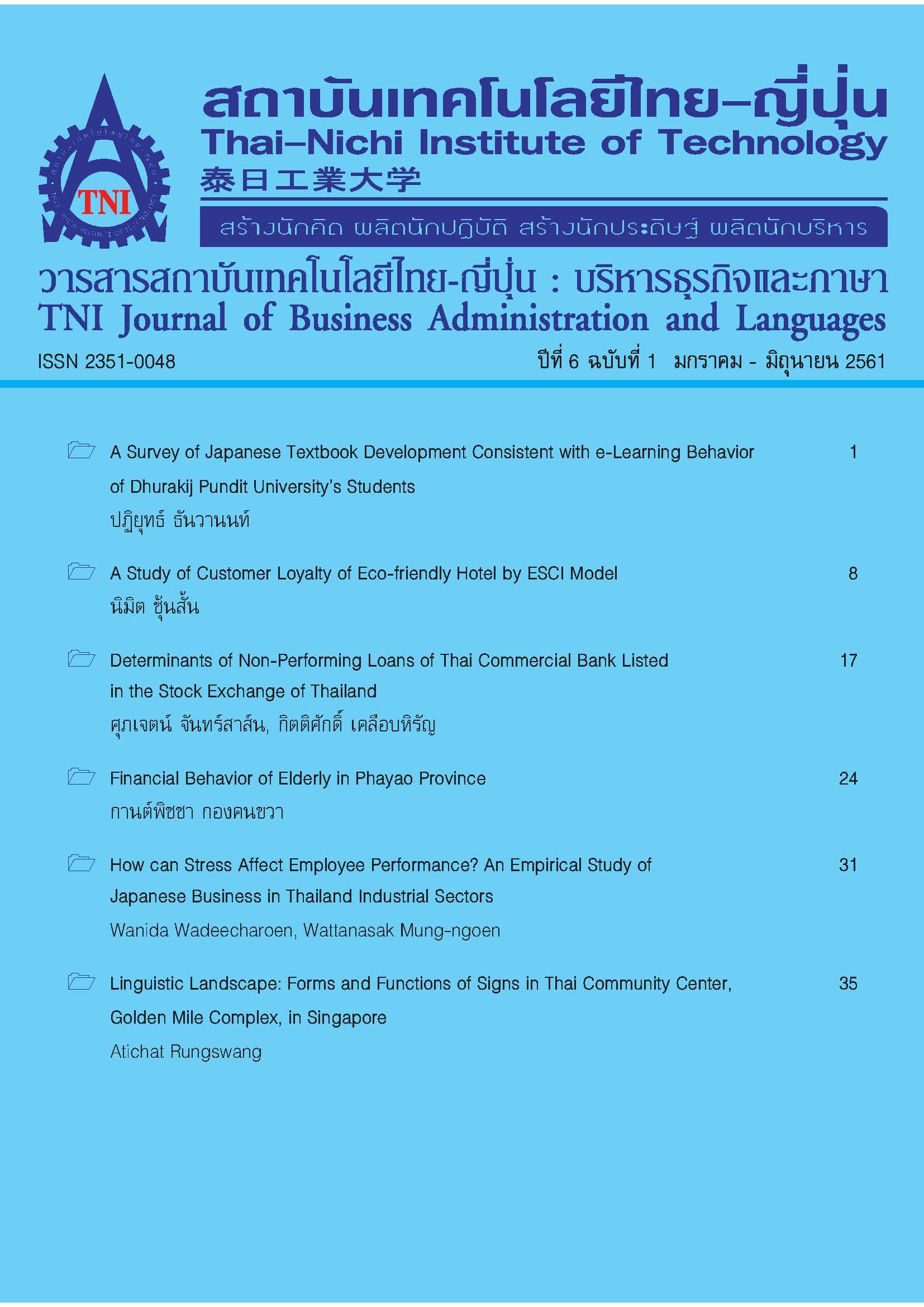How can Stress Affect Employee Performance? An Empirical Study of Japanese Business in Thailand Industrial Sectors
Main Article Content
Abstract
This study has focused on stress at work and its correlate with employee’s performance in Japanese business organization. A sample of 196 were randomly selected across Thailand industrial sectors mainly come from automobile and its assemble business approximately 36% located in Eastern Economic Corridor (EEC) include Chachoengsao, Chonburi, Rayong. The result show that psychology and behavioral stress have correlated with job performance while physical symptoms has no significant related. Work hour has correlated with work stress at 0.01 level of significance. Obviously, work hour has a negative correlated relationship with job performance at 0.05 level of significance. The highlight of the study implied that work stress has a negative impact on employees’ performance, however, increase in stress level at the optimum level make employee exerts better performance.
Article Details
Article Accepting Policy
The editorial board of Thai-Nichi Institute of Technology is pleased to receive articles from lecturers and experts in the fields of business administration, languages, engineering and technology written in Thai or English. The academic work submitted for publication must not be published in any other publication before and must not be under consideration of other journal submissions. Therefore, those interested in participating in the dissemination of work and knowledge can submit their article to the editorial board for further submission to the screening committee to consider publishing in the journal. The articles that can be published include solely research articles. Interested persons can prepare their articles by reviewing recommendations for article authors.
Copyright infringement is solely the responsibility of the author(s) of the article. Articles that have been published must be screened and reviewed for quality from qualified experts approved by the editorial board.
The text that appears within each article published in this research journal is a personal opinion of each author, nothing related to Thai-Nichi Institute of Technology, and other faculty members in the institution in any way. Responsibilities and accuracy for the content of each article are owned by each author. If there is any mistake, each author will be responsible for his/her own article(s).
The editorial board reserves the right not to bring any content, views or comments of articles in the Journal of Thai-Nichi Institute of Technology to publish before receiving permission from the authorized author(s) in writing. The published work is the copyright of the Journal of Thai-Nichi Institute of Technology.
References
M. M. Alkubaisi, “How can Stress Affect Your Work Performance? Quantitative Field Study on Qatari Banking Sector,” Business and Management Research, vol. 4, no. 1, p. 99, Mar. 2015.
C. Chureeporn, “Factors affecting work stress of bank officers of head office of a bank.,” Master’s thesis (Industrial Psychology), Kasetsart University, Bangkok, 2007.
C. P. Cooper, P. J. Dewe, and M. P. O′Driscoll, Organizational Stress: A Review and Critique of Theory, Research, and Applications. Thousand Oaks, Calif: SAGE Publications, Inc, 2001.
P. M. Hart and C. L. Cooper, “Occupational stress: Toward a more integrated framework,” in Handbook of industrial, work and organizational psychology, Volume 2: Organizational psychology, Thousand Oaks, CA, US: Sage Publications, 2002, pp. 93–114.
K. H. Teigen, “Yerkes-Dodson: A Law for all Seasons,” Theory & Psychology, vol. 4, no. 4, pp. 525–547, Nov. 1994.
M. Kotteeswari and S. T. Sharief, “Job stress and its impact on employees’ performance a study with Reference to employees working in BPOS.,” International Journal of Business and Administration Research Review, vol. 2, no. 4, pp. 18–25, 2014.
R. S. Lazarus, “From psychological stress to the emotions: A history of changing outlooks,” Annual Review of Psychology, vol. 44, pp. 1–21, 1993.
S. P. Robbins and T. A. Judge, Organizational Behavior, 17th ed. Boston: Pearson, 2016.
H. Selye, The story of the adaptation syndrome : Told in the form of informal, illustrated lectures. Canadd: Acta, 1952.
H. Wheeler and R. Riding, “Occupational stress in general nurses and midwives,” British Journal of Nursing, vol. 3, no. 10, pp. 527–534, May 1994.
R. M. Yerkes and J. D. Dodson, “The relation of strength of stimulus to rapidity of habit-formation,” Journal of Comparative Neurology and Psychology, vol. 18, no. 5, pp. 459-482.


